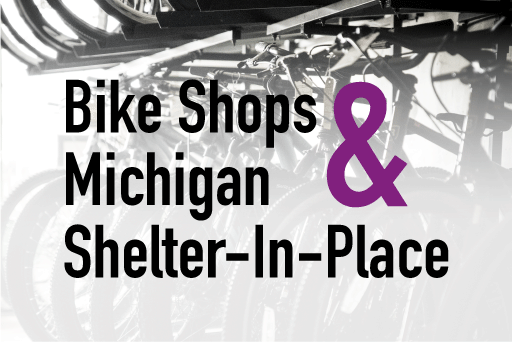As most Michiganders know by now, in the face of the Coronavirus Pandemic, at 11:00 am on March 23, 2020, Governor Gretchen Whitmer issued a “shelter-in-place” Executive Order that applies to all residents of the State of Michigan. The stated purpose of the Order is “to suppress the spread of COVID-19, to prevent the state’s healthcare system from being overwhelmed, to allow time for the production of critical test kits, ventilators, and personal protective equipment (PPE), and to avoid needless deaths, it is reasonable and necessary to direct residents to remain at home or in their place of residence to the maximum extent feasible.”
The Order requires all Michigan residents to “to stay at home or at their place of residence” from March 24, 2020, at 12:01 am through April 13, 2020, at 11:59 pm, with a number of clearly stated exceptions.
What the Michigan shelter-in-place order means for cyclists
Cyclists will be happy to know that one of the enumerated exceptions to the order to stay at home reads:
“Outdoor activity, including walking, hiking, running, cycling, or any other recreational activity consistent with remaining at least six feet from people from outside the individual’s household.” (Emphasis added)
Other exceptions include performing tasks that are necessary for the health or safety of a person or their family members, including obtaining medication or emergency medical care. People are also allowed to leave their homes to obtain essential supplies like groceries and medical supplies.
Michigan residents should be mindful that even when an exception applies, they are still required to follow the social distancing measures recommended by the Centers for Disease Control and Prevention, including remaining at least six feet from other people. And always, always wash your hands.
How will the Michigan shelter-in-place affect Michigan bike shops?
While the Michigan shelter-in-place directive clearly marked out what people can and cannot do in the next three weeks, certain aspects remain unclear, and the impact on Michigan bicycle shops is no different. The language that appears to be most pertinent in Governor Whitmer’s Executive Order states that there is an exception for “critical infrastructure workers.” The Order then defines critical infrastructure workers as:
“For purposes of this order, critical infrastructure workers are those workers described by the Director of the U.S. Cybersecurity and Infrastructure Security Agency in his guidance of March 19, 2020, on the COVID-19 response. Such workers include some workers in each of the following sectors:
(a) Health care and public health.
(b) Law enforcement, public safety, and first responders.
(c) Food and agriculture.
(d) Energy.
(e) Water and wastewater.
(f) Transportation and logistics.
(g) Public works.
(h) Communications and information technology, including news media.
(i) Other community-based government operations and essential functions.”
In short, the Order doesn’t really make it clear if bike shops can continue to operate, and if you took the time to click on the link to the U.S. Cybersecurity and Infrastructure Security Agency guidelines, you are probably still just as confused.
One could argue that bike shops are likely businesses that serve the “transportation” sector. It could be argued bicycle shops are really part of the exercise and recreation sector. However, there is no question that some people do rely on bicycles and the shops that service them as critical transportation. Still, this might not be enough to allow bike shop employees to be considered “critical infrastructure workers.”
Bike shops considered essential businesses under New York and California’s shelter-in-place orders
Some bike shop owners may find comfort in a clarification that came from New York Governor, Andrew Cuomo’s office days after it initially released New York’s shelter-in-place order, which made it clear bicycle shops are an essential business under his shelter-in-place order. Therefore, New York bike shops were allowed to remain open. However, the New York order specifically uses the term “essential businesses” whereas Michigan uses the term “critical infrastructure workers.”
Like Michigan, the California shelter-in-place order uses the term “critical infrastructure workers” when defining classes of people that are allowed to continue working. As in Michigan, people in California were confused about how to apply this term to bicycle shops. In response, San Francisco’s mayor, London Breed, tweeted, “Clarification for those who have asked: just as auto repair shops are considered essential so people can conduct essential travel, so are bicycle repair shops and mobile bicycle repair companies. Social distancing and consistent cleaning requirements continued to be required.”
However, Michigan shop owners should not put much weight on the statement from San Francisco’s mayor. It won’t have authority in Michigan and it is obvious that what someone thinks is critical or essential may not be considered critical and essential to others. Tesla considered itself to be in the transportation sector and designated its employees as critical infrastructure workers and therefore, continued with production after Detroit-based auto manufacturers voluntarily halted production. But the State of California disagreed with Tesla’s self-designated “critical” status and shut down production.
Whitmer’s office provides further clarification for Michigan bike shops
At this point, the best guidance comes from the State of Michigan’s official website, Michigan.gov. The portion of the site intended on clarifying Governor Whitmer’s Order actually addresses whether and/or when bike shops may remain open, with the following Q & A:
Q: Are bicycle shop employees considered critical infrastructure for purposes of Executive Order 2020-21?
A: In general, no. Workers at bicycle repair shops can be designated as critical infrastructure workers only if they provide maintenance for bicycles that other critical infrastructure workers use to get to their jobs. We expect that this condition will be satisfied very rarely.
In short, the official position of the Executive Office of our state government is that bike shops should remain closed, unless they come in to service a bike for a critical infrastructure worker, such as a police officer or healthcare worker. This position seems inconsistent with the position taken for automobile service facilities, which can be found on the same State of Michigan website post, and states:
Q: Are car dealerships open?
A: Auto sales is closed, but auto repair and maintenance can remain open subject to the limitations in section 5 of Executive Order 2020-21.
Supporting Your Local Bike Shop During COVD-19
The State of Michigan has taken a position that prioritizes automobiles over bicycles as a form of transportation for essential workers. The League of Michigan Bicyclists continues efforts to reach the Governor’s office to clarify this issue. At Michigan Bicycle Law, we believe we all need to do our part and make our best effort to follow the Executive Order requiring all of us to suspend activities that are not necessary to sustain or protect life. However, as cyclists, we also believe we all need to do our part to preserve our local bike shops and ensure they will be there when we get through this pandemic. That means making sure we all:
- Resist the temptation to buy bicycles, bike parts, and accessories online. Hopefully, your local bike shop won’t be closed long, and when it re-opens you can stock up on needed supplies.
- Consider buying a gift certificate from your local bike shop(s). There is no doubt you will need to spend some money there when the shelter-in-place is lifted and warmer weather is here. Why not spend the money now (when your LBS may need the cash) and pick up the bicycle supplies or obtain the service later? It will help you and help the small business that allows you to fully enjoy biking.
- Engage on social media. One way to show your support of your local bike shop (and ALL small/local businesses) is by sharing their social media pages, posts, and updates. Sharing is caring. Sharing also lets your friends and family know about these organizations, which could positively impact their bottom lines once we’re on the other side of quarantine and can frequent their establishments and support them in person.
- Embrace the digital era. So many organizations are going digital as much as possible – recording their rides, offering free tune-up info and tutorials, and much more. It’s time to welcome the shift toward the digital and engage online. Remember to share what you’ve found to be helpful or informative with your crew (digitally, obviously).
Wishing everyone health and safety in the days and weeks to come!



